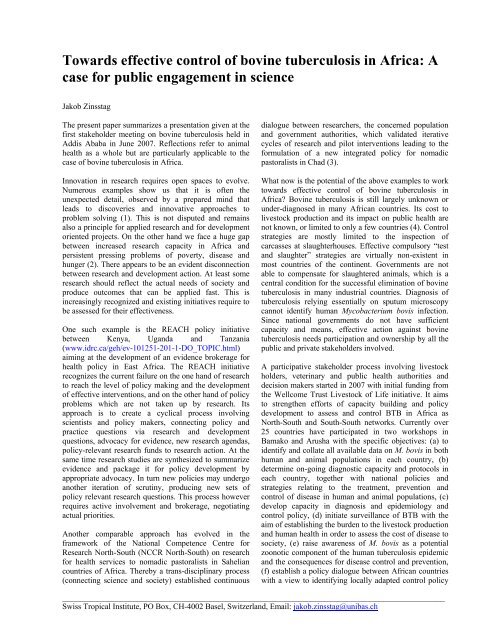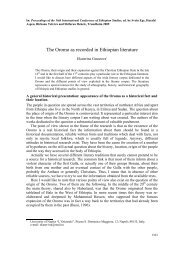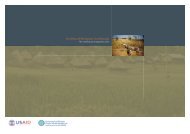Create successful ePaper yourself
Turn your PDF publications into a flip-book with our unique Google optimized e-Paper software.
Towards effective control of bovine tuberculosis in Africa: A<br />
case for public engagement in science<br />
Jakob Zinsstag<br />
The present paper summarizes a presentation given at the<br />
first stakeholder meeting on bovine tuberculosis held in<br />
Addis Ababa in June 2007. Reflections refer to animal<br />
health as a whole but are particularly applicable to the<br />
case of bovine tuberculosis in Africa.<br />
Innovation in research requires open spaces to evolve.<br />
Numerous examples show us that it is often the<br />
unexpected detail, observed by a prepared mind that<br />
leads to discoveries and innovative approaches to<br />
problem solving (1). This is not disputed and remains<br />
also a principle for applied research and for development<br />
oriented projects. On the other hand we face a huge gap<br />
between increased research capacity in Africa and<br />
persistent pressing problems of poverty, disease and<br />
hunger (2). There appears to be an evident disconnection<br />
between research and development action. At least some<br />
research should reflect the actual needs of society and<br />
produce outcomes that can be applied fast. This is<br />
increasingly recognized and existing initiatives require to<br />
be assessed for their effectiveness.<br />
One such example is the REACH policy initiative<br />
between Kenya, Uganda and Tanzania<br />
(www.idrc.ca/geh/ev-101251-201-1-DO_TOPIC.html)<br />
aiming at the development of an evidence brokerage for<br />
health policy in East Africa. The REACH initiative<br />
recognizes the current failure on the one hand of research<br />
to reach the level of policy making and the development<br />
of effective interventions, and on the other hand of policy<br />
problems which are not taken up by research. Its<br />
approach is to create a cyclical process involving<br />
scientists and policy makers, connecting policy and<br />
practice questions via research and development<br />
questions, advocacy for evidence, new research agendas,<br />
policy-relevant research funds to research action. At the<br />
same time research studies are synthesized to summarize<br />
evidence and package it for policy development by<br />
appropriate advocacy. In turn new policies may undergo<br />
another iteration of scrutiny, producing new sets of<br />
policy relevant research questions. This process however<br />
requires active involvement and brokerage, negotiating<br />
actual priorities.<br />
Another comparable approach has evolved in the<br />
framework of the National Competence Centre for<br />
Research North-South (NCCR North-South) on research<br />
for health services to nomadic pastoralists in Sahelian<br />
countries of Africa. Thereby a trans-disciplinary process<br />
(connecting science and society) established continuous<br />
dialogue between researchers, the concerned population<br />
and government authorities, which validated iterative<br />
cycles of research and pilot interventions leading to the<br />
formulation of a new integrated policy for nomadic<br />
pastoralists in Chad (3).<br />
What now is the potential of the above examples to work<br />
towards effective control of bovine tuberculosis in<br />
Africa? <strong>Bovine</strong> tuberculosis is still largely unknown or<br />
under-diagnosed in many African countries. Its cost to<br />
livestock production and its impact on public health are<br />
not known, or limited to only a few countries (4). Control<br />
strategies are mostly limited to the inspection of<br />
carcasses at slaughterhouses. Effective compulsory “test<br />
and slaughter” strategies are virtually non-existent in<br />
most countries of the continent. Governments are not<br />
able to compensate for slaughtered animals, which is a<br />
central condition for the successful elimination of bovine<br />
tuberculosis in many industrial countries. Diagnosis of<br />
tuberculosis relying essentially on sputum microscopy<br />
cannot identify human Mycobacterium bovis infection.<br />
Since national governments do not have sufficient<br />
capacity and means, effective action against bovine<br />
tuberculosis needs participation and ownership by all the<br />
public and private stakeholders involved.<br />
A participative stakeholder process involving livestock<br />
holders, veterinary and public health authorities and<br />
decision makers started in 2007 with initial funding from<br />
the Wellcome Trust Livestock of Life initiative. It aims<br />
to strengthen efforts of capacity building and policy<br />
development to assess and control BTB in Africa as<br />
North-South and South-South networks. Currently over<br />
25 countries have participated in two workshops in<br />
Bamako and Arusha with the specific objectives: (a) to<br />
identify and collate all available data on M. bovis in both<br />
human and animal populations in each country, (b)<br />
determine on-going diagnostic capacity and protocols in<br />
each country, together with national policies and<br />
strategies relating to the treatment, prevention and<br />
control of disease in human and animal populations, (c)<br />
develop capacity in diagnosis and epidemiology and<br />
control policy, (d) initiate surveillance of BTB with the<br />
aim of establishing the burden to the livestock production<br />
and human health in order to assess the cost of disease to<br />
society, (e) raise awareness of M. bovis as a potential<br />
zoonotic component of the human tuberculosis epidemic<br />
and the consequences for disease control and prevention,<br />
(f) establish a policy dialogue between African countries<br />
with a view to identifying locally adapted control policy<br />
______________________________________________________________________________________<br />
Swiss Tropical Institute, PO Box, CH-4002 Basel, Switzerland, Email: jakob.zinsstag@unibas.ch







